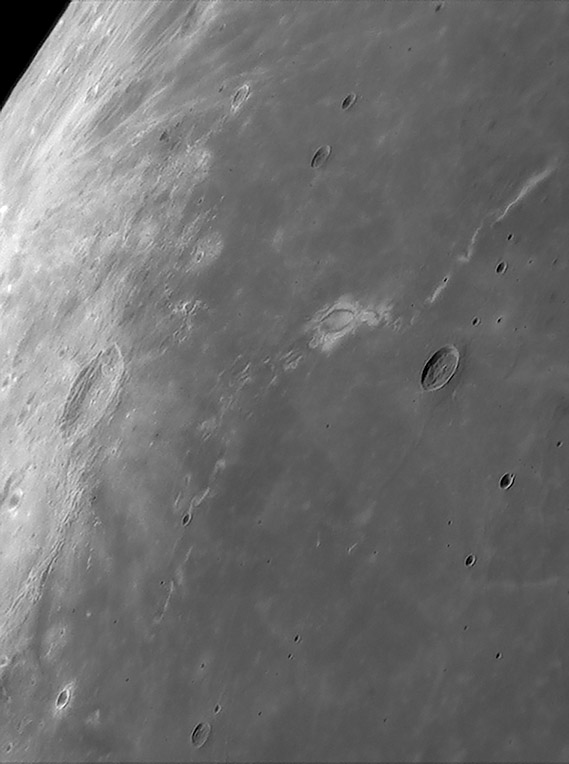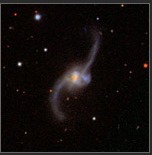

big image by Bob Pilz, small one from GalaxyZoo
Streaks of bright material are the highlight of this high-Sun scene. Radiating from just off the left edge are bright rays from the crater Glushko (formerly well known as Olbers A). Much duller rays fan out onto the mare from Cavalerius at far left. But the reason Bob took this broad view is the series of drops and interupted streaks of bright material that extend in long arcs from both ends of the ellipse of Reiner Gamma. The brighter tail to the north of Reiner Gamma is well known, but the fainter, less-continuous drippings to the south are frequently not noticed. The combined two-tailed structure looks like distant merging galaxies (small picture), but it's not - although we may have more understanding of those cosmic collisions than this stain right in our planet’s backyard. Reiner Gamma was long regarded as a peculiar but not very important feature until it was discovered to be the strongest magnetic anomaly on the Moon. The magnetic field is very tightly focused on the Reiner Gamma ellipse and extends broadly along the northern tail. Just as the albedo features are weaker to the south, the magnetic anomaly is almost non-existent there. In this sense the anomaly looks like an oblique impact with nearly all the ejecta deposited downrange, to the north. But there is no evidence for a crater here, and the pervailing theory is that the magnetism is from a ray of ejecta from the Imbrium basin that is buried under the Procellarum lavas. Of course, the question is why is this piece of ejecta strongly magetized and all the rest isn’t?
Technical Details:
July 9, 2007, ~10 UT. 200mm f/6 Newtonian reflector, Televue 2.5x Barlow, DMK 21BF04 B/W camera, ‘Blue’ IR-block filter, .20 arcsec/pixel, 30 fps, 1/60 sec, 900/9000 frames stacked; processed in Registax V4, PS CS, Focus Magic. Taken from Lat: 35 degrees 36 minutes N, Long: 82 degrees 33 minutes W, Elev:~850m.
Related Links:
Rükl chart 28
Yesterday's LPOD: Impossible?
Tomorrow's LPOD: Smooth Stuff
COMMENTS?
Register, Log in, and join in the comments.



